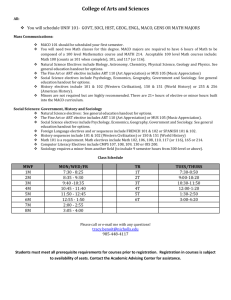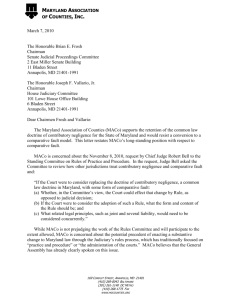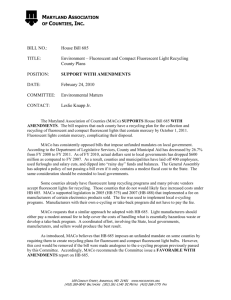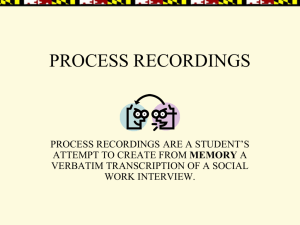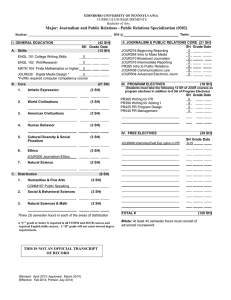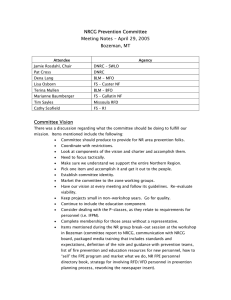Nationally accredited by the Accrediting Council on (ACEJMC)
advertisement
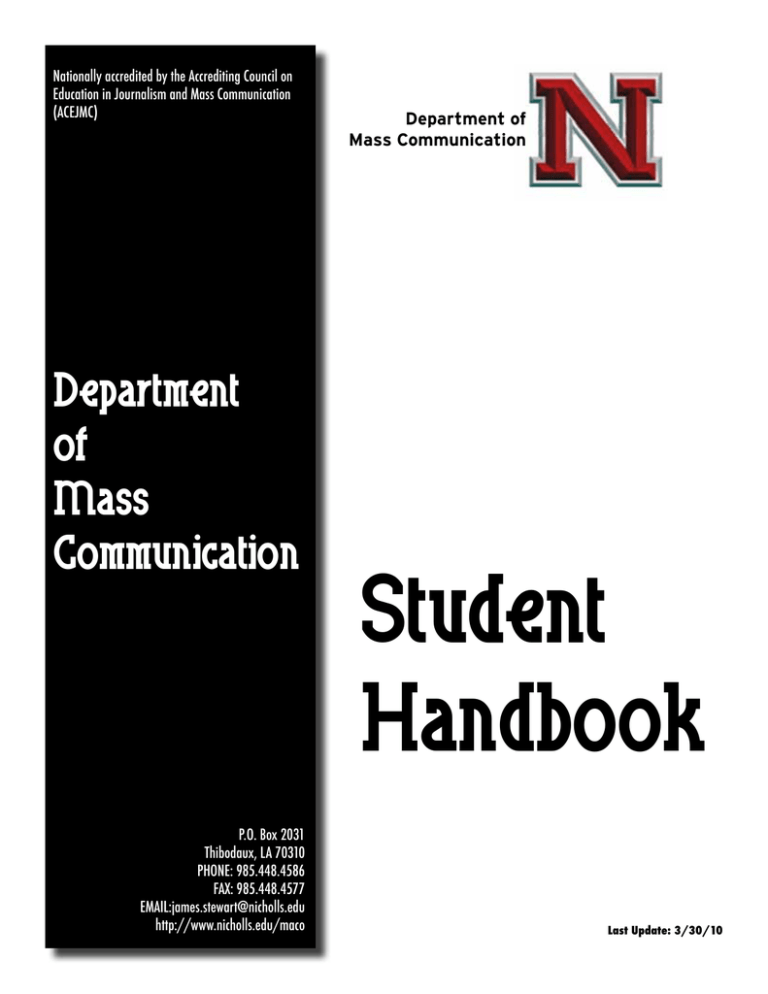
Nationally accredited by the Accrediting Council on Education in Journalism and Mass Communication (ACEJMC) Department of Mass Communication P.O. Box 2031 Thibodaux, LA 70310 PHONE: 985.448.4586 FAX: 985.448.4577 EMAIL:james.stewart@nicholls.edu http://www.nicholls.edu/maco Department of Mass Communication Student Handbook Last Update: 3/30/10 Table Of Contents Introduction . ................................................................................................................................................................ 3 - 4 Program Objectives............................................................................................................................................................. 5 To Qualify for Graduation .................................................................................................................................................. 5 Basic Information .............................................................................................................................................................. 6 Total Required Hours Hours in the Minor Hours Per Semester Course Requirements Outside of the Major or Minor Art English Computer Literacy Foreign Language Health and Physical Education Humanities Mathematics Natural Sciences Social Science University College Mass Communication Requirements ................................................................................................................................... 7 Mass Communication Core Courses and Specialties . ........................................................................................................... 8 Mass Communication Courses & Prerequisites..................................................................................................................... 9 Course Schedules . .....................................................................................................................................................10 - 12 Broadcast Journalism (MCBJ) Print Journalism (MCPJ) Public Relations (MCPR) Mass Communication Course Descriptions ........................................................................................................................ 13 MACO Scholarships & Awards . ......................................................................................................................................... 14 Departmental Organizations . .......................................................................................................................................... 15 Student Portfolios ............................................................................................................................................................ 16 ACEJMC National Accreditation Complaints Process ........................................................................................................... 17 Mass Communication Faculty ........................................................................................................................................... 18 Co-Curricular Transcript Program . ..............................................................................................................................19 - 21 General Education Requirements...................................................................................................................................... 22 Introduction The transition to college isn’t easy. One reason is that many beginning students are confused. They have a lot of unanswered questions. And they need answers to questions they haven’t even thought of yet.This booklet is designed to make the transition easier by answering some of those questions. WHAT IS A UNIVERSITY DEGREE? Nicholls has five degree-granting units, but what is a degree? A college degree is awarded to a student who has successfully completed an outlined course of study. In other words, it is a certificate signifying that a student has satisfactorily completed a specified list of classes.There are different types and levels of college degrees. For example, there are: Associate Degrees Bachelor’s Degrees Master’s Degrees Doctoral Degrees Which generally require two years of full-time course work to complete. Which generally take four years of full-time work to complete. Which generally require two years of work beyond the bachelorís level. Which require about three years of graduate-level work beyond the master’s degree. As a Mass Communication student at Nicholls, you will be pursuing a Bachelor of Arts degree. The Mass Communication program is under the direction of the Department of Mass Communication, which is in the College of Arts and Sciences. 3 HOW DO I COMPLETE MY DEGREE PROGRAM? The first step is to consult your University Bulletin. It contains a wealth of information, and having one is a must for those who want to make their journey through college as smooth as possible. Not only does the Bulletin include information on financial aid, course descriptions and important university regulations (including your rights and responsibilities), it also describes in detail the requirements of the university, college and department for receiving a degree in your chosen area. You should study and become familiar with these requirements. Pay special attention to those courses which require completion of prerequisite classes before you can take more advanced classes. For example, you must take MACO 251 before you can take MACO 252. Bulletins are available in the university bookstore. Also, it is important that you stay in touch with your adviser, a faculty member who helps students stay on the most direct track toward completion of their chosen program. Advisers are also the first people to seek out if you are having problems. Advisers are experienced in helping students work toward a college degree, and it is a good idea to follow their advice. But remember, they are only advisers, and you must accept some responsibility in selecting your courses. This booklet has been published to help you understand the necessary steps in completing your degree plan. The following sections explain the department’s guiding philosophies, offer tips on registration, outline graduation requirements and list required courses, among other things. Achieving a Mass Communication degree is challenging (as are most things worth having), but with interest and effort, it is not beyond your reach. As you can see, there are people and programs available to help you meet the challenge. GENERAL TIPS 1. 2. 3. 4. Independent study and internships must be arranged before registration. Freshman English, mathematics and foreign language courses should be taken in the freshman and sophomore years. Never approach an adviser at the last minute before your registration appointment time. Never cut class to keep a registration appointment. 4 Program Objectives The Mass Communication degree program at Nicholls State University provides professional preparation that emphasizes basic skills. Its objective, reflected in its emphasis on a broad-based liberal arts education, is to prepare students for careers in the communication industry and for life in general. The faculty believes that success in every area of communication from newspaper reporting to corporate public relations to broadcast news begins with strength in the basics. Mass Communication specialties are organized around a core curriculum that emphasizes reporting, writing, and understanding the role of the media in a modern, complex society. The emphasis on fundamentals is supported by hands-on laboratory instruction that provides you with situations, experiences and equipment much like those you will find in the working world. The success of Nicholls graduates on the job confirms Nicholls’ belief that mastery of the basics is the correct approach. Employers frequently comment on the ability of Nicholls graduates to fit into their jobs immediately. Further, many Mass Communication graduates find their work excellent preparation not only for Mass Communication but also for further education in graduate or law schools as well as for jobs. Mass Communication professionals need more than journalistic skills. They also must be well educated in the arts and sciences. At least 65 hours of a Mass Communication major’s course work must be in English, foreign language, literature, history, political science, economics, mathematics, humanities, fine arts and the natural sciences. Eighty four hours must be completed outside the major. To Qualify For Graduation Students Must Complete 1. Total number of hours: 120 2. Total number of hours outside of MACO: 84 3. Total number of hours in the traditional arts & sciences: 65 Traditional Arts & Sciences defined: a. All courses in the College of Arts & Sciences except Computer Science courses b. Psychology courses (College of Education) c. Economics courses (College of Business) 4. 45 hours (15 courses) of 300-level or above courses 5 Basic Information MINIMUM GRADUATION REQUIREMENTS 1. To qualify for graduation, students must complete either 120. At least 45 hours must be in courses numbered 300 and above. 2. Mass Communication majors must earn grades of C or better in freshman English and in all required Mass Communication courses. They must also earn a C or better in Mathematics 100 or 101 or 117. 3. Mass Communication majors are limited in the maximum number of hours they may take in a semester. The total is determined by the overall grade-point average (GPA). 4. No more than 12 hours in MACO courses may be transferred from other schools. GPA Hrs. Per Semester Summer Session Less than 2.0 13 6 2.0-2.5 15 8 2.6-3.0 18 9 3.1-3.5 20* 10 3.6-4.0 21* 12 * Requires approval of adviser & dept. head. 5. Courses required: Arts: Completion of nine semester hours of arts electives from the following courses: Any ART or MUS course, FNAR 105, 301, 302, or SPCH 210, 300 as specified by the major/minor/concentration/certification. Computer Literacy: Completion of MACO 322 or MACO 362. English: Completion of freshman English courses with at least a C. Students are advised to take English courses taught in a computer lab. They must also complete one of the following sequences, 253/254 or 255/256 or 315/316 for a total of 12 hours of English credit. Foreign Language: Completion of six semester hours in one language. Health and P.E.: Completion of one 2-hour activity course (which includes personal wellness requirement) from Lifetime Skills, Sport Skills, or Movement Arts Activity Courses or any other H&PE course. Humanities: Completion of nine semester hours to include History 101/102 or 105/106 or 150/151 or 160/161 or 255/256 and English Literature at the 200-level or above as specified by the major/concentration/certification. Mathematics: Completion of six semester hours from the following sequences: MATH 100/117 or MATH 101/117 or MATH 117/214. Natural Sciences: Completion of nine semester hours from physical and biological sciences including a two-semester sequence. Biological sciences include biology; sequences include BIOL 105/106; BIOL 105/108; BIOL 114/116; BIOL 155/156. Physical sciences include astronomy, chemistry, geology, physical science, or physics; sequences include ASTR 101/102; CHEM 101/102; 101/208; 105/106; 221/222. GEOL 101/102; 211/213. PHSC 101/102; 101/103; 102/103. PHYS 101/102; 201/202. Social Sciences: Six semester hours from two of the following disciplines: ECON,GEOG,GOVT, PYSC, SOCI. Three hours of which must be at sophomore level or above. Freshman Studies: UNIV 101. 6 Mass Communication Requirements BROADCAST JOURNALISM, PRINT JOURNALISM, PUBLIC RELATIONS SPECIALTIES The University awards the Bachelor of Arts degree in Mass Communication with a Mass Communication specialty in Broadcast Journalism, Print Journalism or Public Relations to a student who, in addition to satisfying the minimum requirements for graduation from the College of Arts and Sciences, meets the requirements listed below. A student majoring in Mass Communication must complete one of the three specialties to complete degree requirements. Grades of C or better must be earned in all Mass Communication courses. The program requires 84 hours of credit outside of Mass Communication with 65 of those hours being in basic liberal arts and sciences. Mass Communication majors must receive a C or better in both English 101 and 102. FRESMAN YEAR Hrs. Hrs. English 101,102 (GER)............................. 6 English ***(3 hrs.GER)................................... 6 Foreign Language Elective....................... 3 Foreign Language Elective............................... 3 Freshman Studies Course(UR) . ............... 1 Government 101.............................................. 3 History (GER) ........................................ 6 Mass Communication 101................................ 3 Mathematics ** (GER) . .......................... 6 Mass Communication 251 (GER)...................... 3 Natural Science Electives (GER) . ............. 6 Speech 101 (OCR)............................................ 3 Electives*................................................ 3 Electives*........................................................ 6 Required Concentration Course ....................... 3 JUNIOR YEAR 31 Hrs. SENIOR YEAR 30 Hrs. Arts 251.................................................. 3 Arts Elective (GER) . ........................................ 3 Arts Electives........................................... 3 H. & P.E. Personal Fitness Course .................... 2 MACO 355, 370....................................... 6 Natural Science Elective (GER) ........................ 3 Social Science Elective (GER) . ................. 3 Social Science Elective (GER)............................ 3 Electives*................................................ 6 Electives*........................................................ 6 MACO ELECTIVE........................................ 3 Maco Electives ................................................ 6 Required Concentration Courses . ............ 6 Required Concentration Courses ..................... 6 30 *MACO courses may not be taken as general electives. ** Six hours of Math, Freshmen level or above. 7 SOPHOMORE YEAR *** ENGL 253/254 or 255/256 or 315/316. 29 Mass Communication Core Courses And Specialties REQUIRED OF ALL MAJORS Every Mass Communication major at Nicholls State University must complete four basic core courses: Mass Communication 101 -- Survey of Mass Communication Mass Communication 251 -- News Writing Mass Communication 355 -- History and Principles of Mass Communication Mass Communication 370 -- Mass Communication Law and Ethics In addition to these courses, every student must complete five additional courses related to his or her Mass Communication specialty. The three specialties are Broadcast Journalism, Print Journalism and Public Relations. The requirements for these specialties include the courses listed below and nine hours of mass communication electives. BROADCAST JOURNALISM Mass Communication 271 -- Broadcast News Writing Mass Communication 361 -- Television Production Mass Communication 362* -- Television Workshop (CLR) Mass Communication 401 -- Broadcast Journalism Mass Communication 402 -- Broadcast Journalism Workshop (Capstone course) PRINT JOURNALISM Mass Communication 252 -- Advanced News Writing Mass Communication 322* -- Computers for Mass Communication (CLR) Mass Communication 326 -- News Editing Mass Communication 451 -- Feature Writing Mass Communication 455 -- Public Affairs Reporting (Capstone course) PUBLIC RELATIONS Mass Communication 252-- Advanced News Writing Mass Communication 322 -- Computers for Mass Communication (CLR) Mass Communication 330 -- Public Relations Mass Communication 430 -- Public Relations Practice and Case Studies Mass Communication 440 -- Public Relations Campaigns (Capstone course) * MACO 322 or MACO 362 satisfies computer literacy requirements (CLR). 8 Mass Communication Courses & Prerequisite COURSE TITLE MACO 101 Survey of Mass Communication MACO 251 News Writing MACO 252 Advanced News Writing MACO 261 Photojournalism MACO 271 Broadcast News Writing MACO 251 MACO 317 Public Relations Writing MACO 251 & SPCH 101 MACO 322* Computers for MACO None Freshman English MACO 251 None None MACO 326 News Editing MACO 330 Public Relations None MACO 355 History and Principles of MACO None MACO 361 Television Production None MACO 362* Television Workshop None MACO 370 Law and Ethics of Mass Communication None MACO 380 Advertising Copy and Layout MACO 322 MACO 252 & Coreq. 322 MACO 390 Internship MACO Senior Standing MACO 397/398/399 Independent Study None MACO 40l MACO 402 Broadcast Journalism MACO 361 Broadcast Journalism Workshop Credit for or regististration in MACO 401 MACO 430 Public Relations Practice and Cases MACO 440 Public Relations Campaigns MACO 451 Freature Writing MACO 252 or 271 MACO 453 Media Research MACO 101 MACO 455 Public Affairs Reporting MACO 470 Retail Advertising MACO 380 MACO 480 Advertising Concepts and Strategies MACO 380 MACO 499 Seminar in Contemporary MACO *MACO 322 or MACO 362 satisfies computer literacy requirements. 9 PREREQUISITE MACO 252, 322 & 330 MACO 430 MACO 252 or 271 None Broadcast Sem. Gr. Hrs. FRESHMAN YEAR SOPHPOMORE YEAR English 101 English 253/255/315 English 102 English 254/256/316 History MACO 101 History MACO 251 Math MACO 271 Math Speech 101 Sem. Gr . Hrs. Sem. Gr . Hrs. UNIV 101 Foreign Language Foreign Language Natural Sciences Electives Elective Government 101 Sem. Gr. Hrs. JUNIOR YEAR SENIOR YEAR MACO 355 MACO 401 MACO 370 MACO 402 MACO 361 MACO Electives MACO 362 Arts Electives Art 251 Arts Elective MACO Elective Electives Electives Social Sciences (200>) Social Sciences Natural Sciences H. & P. E. 10 Print Sem. Gr. Hrs. FRESHMAN YEAR SOPHPOMORE YEAR English 101 English 253/255/315 English 102 English 254/256/316 History MACO 101 History MACO 251 Math MACO 252 Math Speech 101 Sem. Gr . Hrs. Sem. Gr . Hrs. UNIV 101 Foreign Language Foreign Language Natural Sciences Electives Elective Government 101 Sem. Gr. Hrs. JUNIOR YEAR SENIOR YEAR MACO 355 MACO 451 MACO 370 MACO 455 MACO 322 MACO Electives MACO 326 Arts Electives Art 251 Arts Elective MACO Elective Electives Electives Social Sciences Social Sciences Natural Sciences H. & P. E. 11 Public Relations Sem. Gr. Hrs. FRESHMAN YEAR SOPHPOMORE YEAR English 101 English 253/255/315 English 102 English 254/256/316 History MACO 101 History MACO 251 Math MACO 252 Math Speech 101 Sem. Gr . Hrs. Sem. Gr . Hrs. UNIV 101 Foreign Language Foreign Language Natural Sciences Electives Elective Government 101 Sem. Gr. Hrs. JUNIOR YEAR SENIOR YEAR MACO 355 MACO 430 MACO 370 MACO 440 MACO 322 MACO Electives MACO 330 Arts Electives Art 251 Arts Elective MACO Elective Electives Electives Social Sciences (200>) Social Sciences Natural Sciences H. & P. E. 12 Mass Communication Course Descriptions 101. Survey of Mass Communication. 3-3-0. Print, broadcast, advertising and public relations and their roles in American society; the concept of freedom of the press; the relationship of press and government and of the press and the public; theory, criticisms, problems and ethical concerns of the media. Open to all students. 251. News Writing. 3-3-0. Prerequisites: Completion of freshman English and keyboarding skills. Researching, and writing news, with emphasis on accuracy, brevity, clarity. 252. Reporting. 3-3-0. Prerequisite: MACO 251. Advanced newsgathering, newswriting, and interviewing techniques. 261. Photojournalism. 3-0-6. Prerequisite: None. Camera techniques, darkroom procedures and picture editing for publication. 271. Broadcast News Writing. 3-3-0. Prerequisite: Completion of MACO 251. Lecture and practice in researching, gathering and writing broadcast news. 317. Public Relations Writing. 3-3-0. Prerequisites:MACO 251 & SPCH 101. Fundamentals of public relations writing including news releases, internal communications, and persuasive writing. 322*(CLR). Computers for Mass Communication. 3-0-3. Prerequisite: MACO 251. Emphasis on desktop publishing. Production of publications with a personal computer and laser printer using word processing, media graphics, spreadsheets and interactive page layouts. MACO 322 meets computer literacy requirements. 326. News Editing. 3-3-0. Prerequisite: MACO 252 and Prerequisite/Corequisite 322. Fundamentals of editing for newspapers and related publications; layout; copy reading and headline writing. 330. Public Relations. 3-3-0. Effective use of promotion, publicity, advertising, research techniques, internal and external publications and the news media. Open to all students. 355. History and Principles of Mass Communication. 3-3-0. The development in the United States of newspapers, magazines, radio, television, advertising and public relations; ethical principles of American journalism. Open to all students. 361. Television Production. 3-3-0. Basic procedures for coordinating cameras, microphones, sets, lights, and videotapes. 362*(CLR). Television Workshop. 3-1-4 each. Practical experience in electronic newsgathering and production techniques and MACO 362 meets computer literacy requirements. 370. Law and Ethics of Mass Communication. 3-3-0. Legal and ethical concerns affecting publishing, advertising, broadcasting and public relations. Open to all students. 380. Advertising Copy and Layout. 3-2-2. Prerequisite: MACO 322. Advertising fundamentals, copy, layout and production. 390. Internship. 3-0-10. Prerequisites: Mass Communication major and junior/senior standing. Students intern in a news, public relations or advertising capacity. Must be approved by the department head before registration. A grade of “S” or “U” is assigned upon completion. 397-398-399. Independent Study. 1-0-3. Study or project coordinated by instructor in conference with student. One, two, or all three courses may be taken. Must be approved by the adviser before registration. Can be repeated for credit. 401. Broadcast Journalism. 3-3-0. Prerequisites: MACO 271 & 361. Theory, research, concepts, skills and tools basic to radio and television journalism, including news department operation and news program production. 402. Broadcast Journalism Workshop. 3-0-3. Prerequisite: Credit for or registration in MACO 401. Practical experience in radio and television news writing, videotape news story production, and television news graphics production. 430. Public Relations Practice and Case Studies. 3-3-0. Prerequisites: MACO 252, 322 and 330. Theory, research, concepts, case studies, and the execution of regular and special projects. 440. Public Relations Campaigns. 3-3-0. Prerequisite:MACO 430. Planning, researching, developing, executing, analyzing, and evaluating public relations campaigns. 451. Feature Writing. 3-1-6. Prerequisite: MACO 252 or 271. Writing feature and special articles for newspapers and magazines. 452. Women and Monorities in the Media. 3-3-0. Representation and presentation of women and minorities in the mass media. 453. Media Research. 3-3-0. Prerequisite: MACO 101. Mass communication research methods, including focus groups; survey, content analysis; statistics; copy-testing; audience research; computer application; and evaluation. 455. Public Affairs Reporting. 3-2-3. Prerequisites: MACO 252 or 271. Practical application in researching, news gathering and news writing principles with emphasis on public affairs reporting. 480. Advertising Concepts and Strategies. 3-3-0. Prerequisite: MACO 380. Theory, research and analysis of campaigns and media outlets; the execution of regular and special projects. 499. Seminar in Contemporary Mass Communication. 3-3-0. Open to all students. Discussions on various aspects of mass communication. May be repeated for credit when content is different. 13 MACO Scholarships & Awards In addition to the financial aid and scholarships programs available to the general student body, about $20,000 in scholarships and prizes is awarded annually to full-time majors in Mass Communication. Most awards represent the interest on endowment funds totaling about $400,00 in the custody of the University or the Nicholls Foundation. AWARDS BONNIE TOUPS WELLS FEATURE WRITING PRIZES of $350 and $150 are given each year by the Wells family of Houma to the Mass Communication students who submit the best feature stories of at least 1,000 words on any aspect of Louisiana French or Cajun culture. Entries must have been published in a newspaper or magazine on or off campus during the year. ALFRED DELAHAYE AWARD is presented each year to the outstanding Mass Communication graduate of the academic year. The recipient, chosen by the Mass Communication faculty, receives an engraved plaque and at least $200. CLARENCE DOUCET REPORTING AWARD is presented each year to a Mass Communication major. The award consists of at least $200 and an engraved plaque. A judge determines the winner on the basis of three stories published on or off campus between April 1 and March 30; an entry consists of one hard-news story, one feature and one story of the entrant’s choice. Doucet was managing editor of the Houma Daily Courier in the 1970s. The award is sponsored by John Gravois, 1980 Mass Communication graduate and government editor of the Forth Worth Star-Telegram. OUTSTANDING GRADUATING SENIOR IN EACH SPECIALTY. Every spring the faculty in each specialty names the outstanding graduating senior in Broadcast Journalism, Print Journalism and Public Relations. SCHOLARSHIPS CONGRESSMAN BILLY TAUZIN SCHOLARSHIP of $625 a semester is awarded to a sophomore, junior, or senior in Mass Communication specializing in public relations. Applicants must have at least a 3.0 grade-point average, and a recipient must maintain at least that average for the scholarship to be renewed.The scholarship was established by the Propane Education and Research Council. CLAUDIA BONVILLAIN SCHOLARSHIP of $400 a semester is awarded to an outstanding Mass Communication major who can demonstrate an interest in advertising. It was established by the Houma Courier and Daily Comet. WALLS SCHOLARSHIPS are awarded to Mass Communication students who are high school graduates from Lafourche, Terrebonne or St. Mary parishes, and who are pursuing courses of study in print journalism or advertising. Second priority is given to students of any parish or state. About seven scholarships of $700 a semester are awarded each semester and each is renewable if minimum requirements are met. JOHN B. GORDON MEMORIAL SCHOLARSHIP is awarded to one or more full-time students specializing in print journalism. First priority goes to students planning newspaper careers and who live in Terrebonne Parish or who are graduates of Terrebonne Parish high schools. Second priority goes to high school graduates from anywhere. A 2.0 gradepoint average is required.The scholarship pays about $400 a year. HOUMA COURIER - DAILY COMET JOURNALISM SCHOLARSHIP of $400 a semester is awarded to a Mass Communication major from Assumption, Lafourche, St. Mary or Terrebonne parish. The award is based on need, scholarship, and demonstrated interest in print journalism and consistas of $400 a semester. JENNIE & CO. FILM PRODUCTION SCHOLARSHIP is awarded to a minority student in Mass Communication with a concentration in broadcast journalism. It consists of about $150 a year. NEW YORK TIMES FOUNDATION SCHOLARSHIPS are awarded to deserving minority students in print journalism or advertising. The amount varies from $400 to $800 a semester depending on interest rates and number of recipients. BOB BLAZIER BROADCAST SCHOLARSHIP is awarded to a full-time Mass Communication junior or senior in broadcasting who has at least a 2.5 GPA.Applicants must demonstrate the hard work ethic exhibited by Bob Blazier who taught braodcast courses at the time of his death. LOWREY SCHOLARSHIP of about $300 a year is awarded to a Mass Communication major on the basis of need, grade-point average and professional potential. COMMUNITY BANK EXCELLENCE IN MASS COMMUNICATION ENDOWED SCHOLARSHIP is awarded to a Mass Communication major chosen by the University Scholarship Committee after considering applications from entering freshmen who are graduates of a Louisiana high school.The four-year award pays about $1,000 a semester as long as the recipient is a full-time student in Mass Communication and earns at least a 2.75 grade-point average each semester. 14 Departmental Organizations KAPPA TAU ALPHA The Nicholls chapter of Kappa Tau Alpha invites into membership each fall juniors and seniors who rank in the top 10 percent of their classes academically.The national honor society promotes scholarship in journalism and mass communication. The initiation fee is $20. PUBLIC RELATIONS SOCIETY OF AMERICA The Nicholls chapter of the Public Relations Society of America, a professional organization, cultivates a mutually advantageous relationship between students and professional public relations practitioners. Dues are $50 a year. RADIO-TELEVISION NEWS DIRECTORS ASSOCIATION (RTNDA) The Radio-Television News Directors Association is the world’s largest professional organization devoted exclusively to electronic journalism. RTNDA represents local and network news executives in broadcasting, cable and other electronic media in more than 30 countries. Dues are $65. SOCIETY OF PROFESSIONAL JOURNALISTS The Society of Professional Journalists (SPJ), a professional journalism organization, works to improve and protect journalism. SPJ welcomes broadcast, print, and public relations students, as well as anyone interested in journalism and a free press. Dues are $36 a year. 15 Student Portfolio All students are required to submit a portfolio in their capstone course (MACO 402/Broadcast; MACO 440/Public Relations; MACO 451/Print). Students should be reminded that the department will retain these portfolios.They should retain a copy for their professional use. Portfolios will be organized according to the following outline: Resume Published Work RepresentativeWork Within Specialty Examples of Mass Media Writing RepresentativeWork Across Specialties Where appropriate, Examples of Academic Research These portfolios will be turned in during the second-to-last week of regular classes during the capstone course semester.The faculty as a whole will review each of the portfolios and complete an assessment form. Prior to the end of the semester the faculty will meet to discuss findings.The minutes of this meeting will constitute an assessment report, a portion of the departmentís overall program assessment process. The portfolio is the best means by which the department and interviewers can assess the accomplishments and abilities of the ìprofessionalî experience in both laboratory and professional settings. The portfolio is the studentís greatest tool in marketing himself or herself at the time of graduation. 16 ACEJMC Complaints Process ACEJMC invites all students and other persons to report incidents in which they can present evidence that a unit has violated accreditation standards.The Council requires administrators of accredited units to inform all students of this invitation.The information must include the address and telephone number of ACEJMC. Such reports must be made in writing and should be addressed to the president of ACEJMC. ACEJMC maintains records of all complaints it receives and their resolution. Complaints must be accompanied by documentation showing that: there has been a specific, substantive, continuing violation of one or more standards; the complainant has exhausted all appropriate local channels for resolution; and there is no current litigation related to the complaint. The Council does not adjudicate, arbitrate or mediate individual faculty or student grievances against a program, nor does it act as a court of appeals in individual matters of admissions, appointment, promotion or dismissal of faculty, staff or students. Within five (5) days of receipt of a complaint, the president will direct the executive director to invite a response to the complaint from the institution and to gather such other relevant information as the nature of the complaint indicates. No more than thirty (30) days will be allowed for this process.Within ten (10) days of receipt of the response and other information, the president will convene the Executive Committee.The Executive Committee may recommend that the Council: 1) dismiss the complaint; 2) find the unit out of compliance with one or more standards; or 3) find the unit in violation of one or more standards to a degree that requires a change in its accreditation status. The president of the Council will notify the unit and the complainant of the recommendation in writing within ten (10) days. The Council will consider the complaint, the response, other information, and the recommendation of the Executive Committee at its next regularly scheduled meeting. Decisions of the Council are final. In considering complaints, the Council will give careful attention to due process for both the complainant and the unit.The president of the Council will notify the unit and the complainant in writing of the Councilís decision within ten (10) days of the decision. The Council also requires all units seeking accreditation to maintain records of student complaints and their resolution.As part of the site visit, a visiting team member examines the unitís record of student complaints.The Council expects this record to show timely, equitable and fair resolution of student complaints that are pertinent to the units; compliance with accreditation standards. 17 Mass Communication Faculty CONTACT INFORMATION James Stewart, Head/Associate Professor/102 Talbot/Print Phone: 985-448-4578 Email: james.stewart@nicholls.edu Sheila Zeringue/102 Talbot Phone: 985-448-4586 Email: sheila.zeringue@nicholls.edu Lance Arnold/Instructor/107-B Talbot/Broadcast Phone: 985-448-4613 Email: lance.arnold@nicholls.edu Nicki Boudreaux/Instructor/100-B Talbot Phone: 985-493-2537 Email: nicki.boudreaux@nicholls.edu Lloyd Chiasson/Professor/100-A Talbot/Print Phone: 985-448-4632 Email: lloyd.chiasson@nicholls.edu Al Delahaye/Professor Emeritus/100-C Talbot/Print Phone: 985-448-4579 Email: al.delahaye@nicholls.edu Rick Duet/Associate Professor/101-A Talbot/Public Relations Phone: 985-448-4228 Email: rick.duet@nicholls.edu Felicia L. Harry/Instructor/100-D Talbot Phone: 985-448-4959 Email: felicia.harry@nicholls.edu Stephen Hermann/Director, Student Publications/SPP Phone: 985-448-4261 Email: stephen.hermann@nicholls.edu Andy Simoncelli/Assistant Professor/Coordinator, Electronic Learning/110 Goaux Hall Phone: 985-448-4131 Email: andy.simoncelli@nicholls.edu 18 Co-Curricular Transcript Program Nicholls State University has a Co-Curricular Transcript Program which reflects the studentís involvement in extra curricular and co-curricular activities as well as honors and awards received each semester he/she is enrolled in the University. The Co-Curricular Transcript is an official university document with an appropriate verification stamp/seal. The Co-Curricular Transcript program has been implemented at other institutions. The transcript may be submitted for consideration for awards, admission to graduate and professional schools and with employment applications. At Nicholls, it is used to consider students nominated for Hall of Fame,Who’s Who, Mr./Ms. Nicholls, and various scholarships. Each student is responsible for reporting her/his involvement, awards received, etc. He/she must obtain the signature of the activity advisor in order to verify his/her involvement in the activity. Information will be accepted for the current and previous academic years. Co-Curricular Activity Reporting Forms (see attached) may be obtained from Student Affairs or Student Life. Copies of Co-Curricular Transcripts will be available 15 work days after receipt of CoCurricular Activity Reporting Forms Official copies of Co-Curricular Transcripts will be issued upon written request made to the Office of Records and Registrations. Transcript Request Forms are available in the office of Records and Registration, as well as on the Nicholls website. There is no charge for transcripts. 19 STUDENT LIFE OFFICE NICHOLLS STATE UNIVERSITY C0-CURRICULAR ACTIVITY REPORTING INSTRUCTIONS The purpose of this report is to create a permanent record of student involvement and achievement outside the classroom. This record will become a transcript that can be requested in the Registrarís Office. Co-Curricular Activity Reporting Forms are completed by the student. The student must obtain the signature of the activity advisor in order to verify his/her participation in the activity. List activities and awards by semester from the list presented below. The University reserves the right to review this report for appropriateness and University relatedness, and may use the report to determine certain awards and honors. Activities: SGA: SPA: Peer Assistance: Judicial Board: Student Organizations: IFC/Panhellenic: Fraternity/Sorority: Student Media: Performing Arts: Visual Arts: Intercollegiate Sports: Intramural Sports: Service to the University: President, Vice President, other members of Executive Board, Senator. President, Vice President, At-Large Member, other Executive Board member, Committee chairperson, Committee member. President, Vice President, Director of Insight Theatre, Team Coordinators, team members. Chairperson, member. President, officer, member. President, officer, committee chair, delegate. President, officer, member. La Pirogue; Nicholls Worth; KNSU; Mosaic; Chez Nous. Editor/manager, Assistant Editor/manager, Business Manager, Staff. Theater; Band; Vocal Ensembles; Dance; (student conductor, lead role, stage manager, officer, production staff, performers). One Person, Group Show. Athletic team captain, member, student trainer, manager. Cheerleaders, colonelettes: captain, member. Mascot. Participant in one major (flag football, volleyball, basketball, softball) or three minor sports. Student Support Staff: Awards/Honors: Residence Hall Director, Assistant Director, Resident Assistant; Upward Bound staff; Orientation group leader; volunteer tutoring; new-student recruitment activities. Service on University/college/department committees. Honor Societies: Scholarships: Awards: Academic Recognition: Intramurals: President, officer, member. Academic, merit based. Honors and recognition on campus and off for University-related activities. (Mr/Ms Nicholls, Who’s Who, Student Employee of Year; etc. University, college, department awards; selection to honor society; Author/co- author of publication in refereed journal. Campus, state, regional, or national championship. 20 21 General Education (GER) Core Curriculum Requirements for the Baccalaureate Degree A. Core Proficiencies Effective Communication: Writing ENGL 101 or ENGL 111 ENGL 102 or ENGL 112. Each student shall fulfill English competency requirements by earning a C or better in 102. WRITING-INTENSIVE COURSE: From ENGL 264, 266, 310, 366, 368, 468, BSAD 310, MACO 251 as specified by the major/minor/concentration/certification. These courses teach effective writing within a discipline with primary emphasis on the further development of essential writing and reasoning 9 hours (3 hrs.) (3 hrs.) (3 hrs.) skills necessary for success in students’ academic, personal, and professional lives. Quantitative Reasoning: Mathematics Math 101 College Algebra. Each student shall fulfill mathematics competency requirements by earning a C or better in 101 or by earning credit in calculus. Math elective as specified major/minor/concentration/certification. B. Breath of Knowledge Areas Fine Arts One course from ART, FNAR, MUS, SPCH 300 as specified by the major/minor/concentration/ certification Humanities From HIST 101, 102 or HIST 105, 106 or HIST 150, 151 and English Literature at the 200-level or above as specified by the major/minor/concentration/certification. Natural Sciences From a two semester sequence in either the area of the biological or the physical sciences as specified by the major/minor/concentration/certification. Biological sciences include biology; sequences include BIOL 105,106; 105, 108; 114, 116; 155, 156. Physical sciences include astronomy, chemistry, geology, physical science, or physics; sequences include CHEM 101, 102; 101, 208; 105, 106; 221, 222. GEOL 101, 102; 211, 213. PHSC 101, 102; 101, 103; 102, 103. PHYS 101,102; 201, 202. One natural science course in an area (biological or physical) other than that selected for the sequence above as specified by the major/minor/concentration/certification. Social and Behavioral Sciences From following disciplines: ECON, GEOG, GOVT, PSYC, SOCI. Three hours of which must be at sophomore level or above as specified by the major/minor/concentration/certification. 6 hours (3 hrs.) (3 hrs.) 3 hours (3 hrs.) 9 hours (9 hrs.) 9 hours (6 hrs.) (3 hrs.) 6 hours (6 hrs.) 22
